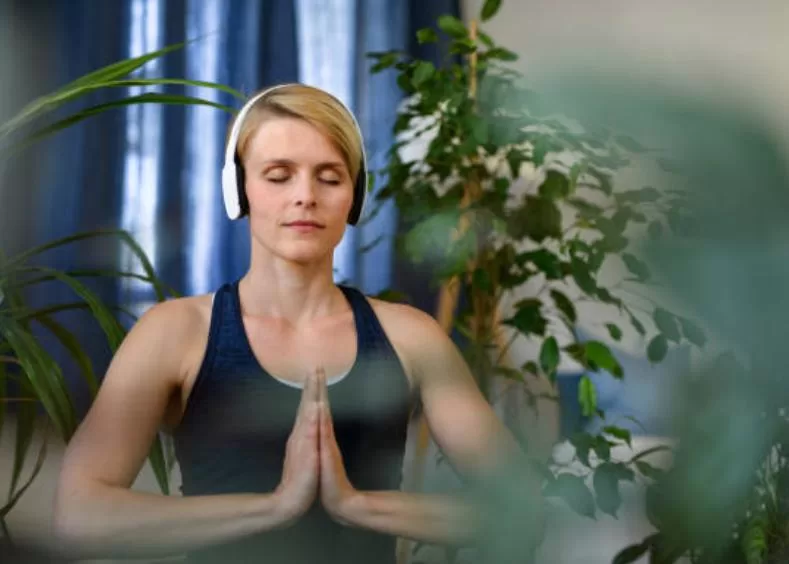How Can Meditation be Used to Improve Self-Awareness?

Selfpause Affirmation App
Download the app to get 1,000’s of affirmation meditations and everything you need to write, record and listen to your own.
The use of meditation can help people unwind, concentrate, and become more self-aware. Understanding one’s own thoughts, feelings, and beliefs as well as how they influence one’s behavior and choices is known as self-awareness. We shall examine how meditation can enhance self-awareness and how it can enhance one’s general wellbeing in this text.

Focusing on the present moment is one of the key advantages of meditation. By enabling one to become more conscious of one’s thoughts, emotions, and physical sensations, this can aid in improving self-awareness. One can start to comprehend how these things affect their actions and decisions by increasing their awareness of them.
The ability of meditation to lessen stress and anxiety is another advantage. It can be challenging to stay present and be conscious of one’s thoughts, emotions, and physical sensations when under stress or anxiety. One can become more conscious of these things and comprehend how they influence one’s actions and decisions by reducing stress and anxiety through meditation.
Additionally, meditation can help you better control your emotions. The capacity to control one’s emotions in a healthy manner is known as emotional regulation. One can start to comprehend how emotions affect one’s actions and decisions by increasing one’s awareness of them through meditation. Additionally, one might enhance general wellbeing by developing healthy emotional management skills.
Additionally, meditation can help in increasing cognitive flexibility. Cognitive adaptability is the capacity to think in many ways and respond to shifting circumstances. One can start to comprehend how one’s ideas affect one’s behaviors and decisions by becoming more conscious of them through meditation. Additionally, one might enhance general wellbeing by developing diverse thought processes.

Last but not least, self-compassion can be enhanced by meditation. The capacity to be understanding and compassionate to oneself is known as self-compassion. One can start to comprehend how they influence one’s actions and decisions by increasing awareness of one’s thoughts, emotions, and physical sensations through meditation. Additionally, one might enhance general wellbeing by developing self-kindness and compassion.
Mindfulness meditation is one method of using meditation to raise one’s level of self-awareness. Focusing on the present moment without passing judgment is a component of mindfulness meditation. It can assist people in understanding how their ideas, feelings, and physical sensations influence their behaviors and decisions as well as in becoming more conscious of these things. Additionally, emotional regulation and general wellbeing can be enhanced by learning to notice one’s thoughts and emotions without passing judgment.
Self-inquiry or “inner investigation” meditation is another technique for using meditation to enhance self-awareness. This kind of meditation is concentrating on a particular aspect of oneself and examining it without judgment, such as one’s thoughts or feelings. This can aid people in bettering their self-awareness and comprehension of themselves.
Lastly, visualization or guided imagery can be utilized during meditation to enhance self-awareness. In order to better comprehend oneself, this entails employing mental imagery to investigate various facets of oneself. This can aid people in bettering their self-awareness and comprehension of themselves.

Furthermore, it’s critical to keep in mind that meditation is not a quick remedy for raising self-awareness. It is a habit that develops with time and persistence. One will be able to understand and see themselves more when they meditate, which will help them become more self-aware.
Being non-judgmental is a crucial consideration while utilizing meditation to increase self-awareness. It’s crucial to accept one’s thoughts, feelings, and physical experiences without passing judgment on them. Instead of attempting to alter or repress one’s ideas, feelings, or body sensations, one can learn to understand and accept themselves as they are by practicing non-judgment.
It is also important to remember that meditation is not only about quieting the mind, but also about developing the ability to observe oneself in a non-judgmental way. This means that if the mind wanders during meditation, it is not a failure, but an opportunity to observe and understand the mind’s tendencies and habits.
Finally, practicing meditation can help with relaxation, concentration, and self-awareness. One can increase their awareness of their thoughts, feelings, and physical sensations through meditation, and learn how these factors influence their behavior and choices. Additionally, one can enhance general wellbeing by learning to manage stress and anxiety, enhance emotional regulation, cognitive flexibility, and practice self-compassion. Self-awareness can be increased via a variety of meditation techniques, including mindfulness, self-inquiry, and visualization. Finding the style of meditation that resonates with the individual is crucial, as is experimenting with various techniques and methods to see which ones are most effective for them.
